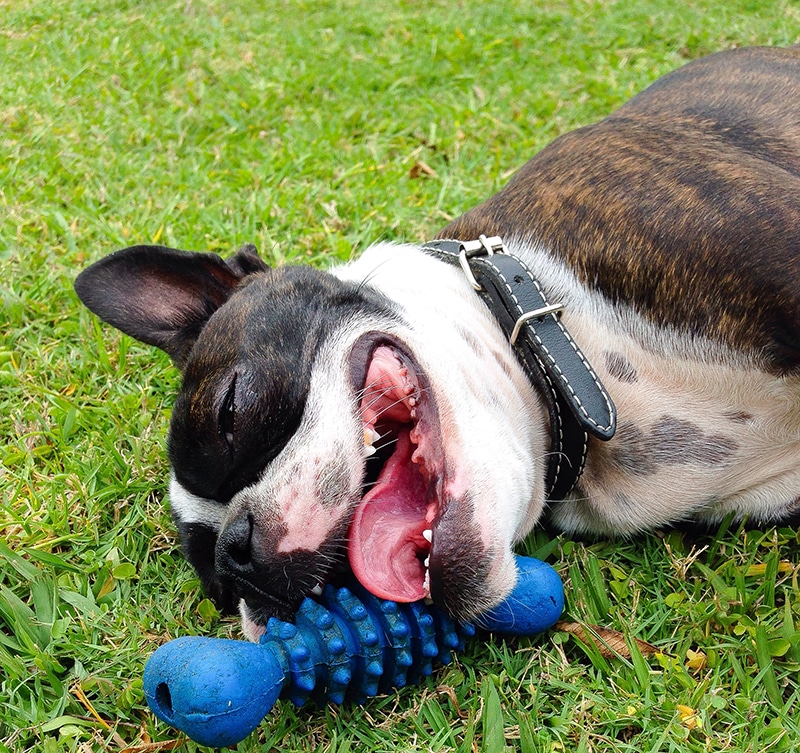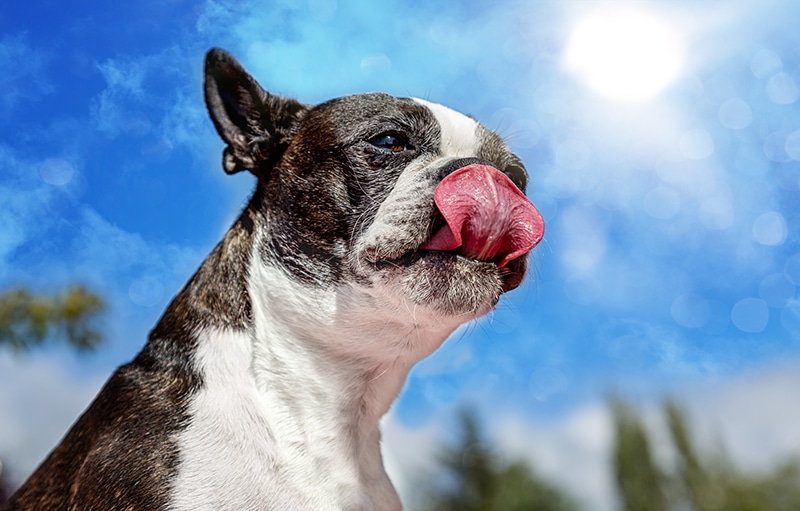Picking the best dog food for your Boston Terrier can be a challenging task. There are plenty of decisions to make. First, you need to consider fido’s life stage and health requirements. Next, you need to ensure that she gets all the proper nutrients from the highest quality sources. All of this with the abundance of information might be overwhelming.
I used my 12 years of Veterinary experience and reviewed over 100 dog food products to find the best dog food for Boston Terriers.
After considering the nutritional needs along with genetic health conditions that Boston Terriers tend to have, I found that “Farmina N&D Ancestral Grain” is the best overall food for adult Boston Terriers. In addition to meeting my dietary criteria for Boston Terriers, it has the best combination of nutrients and quality sources.
But I understand that no two Boston Terriers are alike, and your Boston Terrier might have a different life stage or have different needs. That’s why I prepared a shortlist of the best Boston Terrier foods that address the most common Boston Terrier needs.
In addition to picking the best products for your pooch, I outlined my process for choosing dog food. I want you to know what gets inside the furry stomach. The process is written in plain & simple English that will help you make wiser dietary decisions for your Boston Terrier.
I encourage you to read our review process and check out our in-depth reviews below so that you’ll be able to come up with your own dietary decisions.
Let’s get started.
Before You Pick The Best Food For Your Boston Terrier

There’s no such thing as one food that fits all Boston Terriers. While I did my best to find the best food for most Boston Terriers, you might prefer to pick a more specific formula.
That’s why I elaborate here our main considerations while reviewing the best dog foods for Boston Terriers.
You can divide your research journey into 3 steps:
- First, pick the right food for your Boston Terrier’s life stage – Puppies, Adults, and Senior Boston Terriers are in different development stages. Their joints, bones, and muscles develop at a different pace. That’s why you’ll need to pick the proper nutrients in the correct quantity for your Boston Terrier’s life stage.
- Picking the right food to reduce common Boston Terrier health issues – Each dog breed has an increased risk of catching certain health conditions. These health conditions are genetic, and Boston Terriers are not indifferent. So make sure to pick the right ingredients to support common Boston Terrier health issues.
- Picking suitable nutrient sources – Sometimes, two dog foods might seem similar. Both could provide the same nutritional value. However, it’s essential to question how these nutrients were sourced. We want to avoid chemicals and low-quality nutrients that can introduce some side effects.
The rest of the guide will show you how to pick the right food for your Boston Terrier’s life stage, how diet helps with common Boston Terrier health issues, and what to look for on the label.
For your convenience, I (Dr. Libby Guise) shortlisted 13 dog foods. These foods were carefully selected and should satisfy your Boston Terrier’s needs. I also noted which food is best for certain life stages or particular health issues.
After going through the shortlist, you can find additional considerations that might be of interest to you and your fur-baby.
Finally, I answered the most popular questions that I’m being asked regarding Boston Terriers’’ nutrition and diet.
Please keep in mind, while I tried to do my best to find the best food for your Boston Terrier, it would be a good idea to understand how and why we made our decisions.
The recommendations in this review are not intended to replace the doctor-patient relationship. Always consult your veterinarian before making significant adjustments to your furbaby’s diet.
The Right Diet For Puppies, Adults, And Senior Boston Terriers

Adorable, loving, and protective, Boston Terriers make popular pets. As a small breed, they tend to have a high metabolism and need lots of energy, but their activity levels vary widely.
But these elegant dogs also have some health problems. As a brachycephalic breed, the Boston Terrier is prone to eye conditions and breathing difficulties. Your furbaby can also suffer from hereditary joint issues and heart disease. Other health concerns include food allergies and sensitivities and Cushing’s disease.
With this list of health issues, it’s crucial to ensure your pooch gets quality nutrition. These pups need a high-protein (minimum of 22% for puppies and 18% for adults) diet with low to moderate fat. Quality ingredients including meats, animal fats, whole grains, fruits, and vegetables can help provide a balance of essential nutrients. Avoid fillers and cereals like corn, wheat, and soy.
In addition to healthy fats like omega fatty acids, feed your pooch foods with complex carbohydrates to meet his energy needs. But don’t overdo the carbs. Boston Terriers can suffer from breathing difficulties and exercise intolerance, and they’re prone to obesity and joint problems. Instead, choose products with wholesome fiber sources like garden vegetables and fruit. Formulas with glucosamine and chondroitin supplements can also support cartilage health as your furbaby ages.
Daily Calorie Requirements
When it comes to Boston Terriers, their caloric needs can vary because these pooches adapt to their family’s activity level. Energy demands also change with age.
Puppies will need extra calories to fuel their growth and playfulness while seniors tend to need fewer calories.
In general, an adult Boston Terrier will need between 30 and 40 calories per pound per day. Less active pups will be on the low end and active dogs will be on the high end. Because they need extra energy for growth, puppies need about twice as much as adult dogs. In the senior years, calorie requirements will be a little lower. Switch to a senior diet, and target around 25-30 calories per pound.
Feeding Quantity & Frequency
While you can take your pup’s daily calorie requirement and divide it by the calories per cup listed on the label, it’s easier to follow the package guidelines. You can adjust slightly up or down depending on your pup’s activity level.
The frequency of feeding will vary by age. Younger dogs need to eat more often to avoid drops in blood sugar. As your pooch ages, the number of feedings may vary depending on his activity level.
- Puppies – For young puppies, divide their daily portion into four meals to provide consistent energy. At about 6 months, you can begin to transition to three meals a day.
- Adults – Boston Terriers reach adulthood around 1 year of age. At this point, you can feed your pooch 2-3 meals a day.
- Seniors – By age seven, Boston Terriers may become less active. They should be fine with two meals a day.
The Appropriate Nutrition For Common Boston Terrier Health Issues

Some health conditions are more popular among Boston Terriers than other dog breeds. Each breed inherits some genes that can be associated with certain health issues.
It doesn’t mean that fido is going to develop these conditions, it just means that Boston Terriers have a higher chance as compared to other breeds.
However, it’s possible to reduce the risk by proactively feeding Boston Terrier with the right nutrients. Here we list the most common Boston Terriers health issues and how certain nutrients can reduce risk.
A quick reminder: if you think your special pal suffers from any of these conditions, schedule an exam with your veterinarian to confirm your suspicions. Even with healthy dogs, these dietary recommendations may help prevent future problems. Always check with Fido’s doctor before making changes in his diet.
Eye Problems
Boston Terriers belong to a group of breeds that have flat faces and bulging eyes. The anatomical features and other genetic traits predispose these pooches to several eye problems including:
- Corneal ulcers – bulging eyes make Boston Terriers vulnerable to eye injuries and ulcers.
- Cataracts – cloudiness or opacity in the lens that impairs vision
- Glaucoma – abnormally high pressure inside the eye that can damage the optic nerve and cause vision loss
- Cherry eye – inflammation of the third eyelid that causes a red bulge
- Distichiasis – extra eyelashes along the margin of the eyelid that can irritate the cornea
- Keratitis sicca(dry eye) – the lacrimal gland fails to produce enough tears, and the eye becomes dry and inflamed
- Entropion – the eyelid rolls inward and the lashes rub on the eyeball causing irritation
You may not be able to prevent some of these conditions, but you can supply your pooch with nutrients that support vision health. Look for foods that include:
- Yellow and orange vegetables like pumpkin or carrots for beta-carotene
- Antioxidant-rich food berries
- Green vegetables including broccoli and spinach for phytonutrients
- Sources of omega fatty acids like trout and salmon
Joint Problems
Boston Terriers can suffer from joint disease later in life due to some genetic conditions. The most common problem for this breed is patellar luxation, but they can also develop hip dysplasia. In both cases, the joint develops abnormally resulting in extra motion between the bones and damage to the cartilage.
The first thing you want to support joint health is a diet with protein-rich, quality ingredients that provide essential amino acids for lean muscle mass. Choose foods that are low fat and have limited carbs to prevent obesity. Additionally, look for key nutrients that can help support joint health:
- Glucosamine and chondroitin for joint mobility and cartilage repair
- The right balance of calcium and phosphorus for bone strength
- Natural sources of omega fatty acids to help manage inflammation
Hair Loss and Dry Skin
This breed has a super sensitive immune system, so they often react to food or environmental allergens. Frequently, the result of these reactions is irritated, dry, flaky skin or dermatitis. As the inflammation spreads, your pup scratches or licks at affected areas and develops hot spots and hair loss.
To help your pal maintain his thick, shiny coat and healthy skin, choose diets that are rich in omega fatty acids including DHA and EPA. Other nutrients that provide support for your furbaby include B-complex vitamins, Vitamin E, and zinc to boost the immune system. Supplementation with probiotics can help soothe a sensitive gut. If you suspect a food allergy, consult with your veterinarian about trying an elimination diet or food trial to pinpoint the offending ingredients. Common food allergens for Boston Terriers include corn, gluten, soy, and wheat.
Obesity
Canine obesity is a common problem among most breeds including the Boston Terrier. When your pooch consumes more energy than he needs for daily activities, he’ll gain weight. The extra pounds put extra strain on the joints, respiratory system, and heart. To help your furbaby reach and maintain a healthy weight, choose foods that are high in quality protein but have lower fat and restricted calories from carbohydrates. Whatever you do, do not free-feed your pooch. Keep him on a feeding schedule.
Breathing Problems
Boston Terriers belong to a group of dog breeds that suffer from Brachycephalic Airway Obstruction Syndrome (BAOS). On the outside, it looks like a flat face, but under the surface, these dogs also have:
- Narrow nostrils
- An elongated soft palate
- A narrow trachea and larynx
These anatomical conditions combine to create breathing difficulty that can cause exercise intolerance, heat intolerance, snoring, and sometimes fainting.
The main way diet can help support a dog with BAOS is through weight management. Provide high-protein, low-fat, low-carbohydrate food that has quality, digestible ingredients. Other helpful supplements include omega fatty acids and antioxidant-rich ingredients. You should also avoid common food allergens that may cause inflammation in the airway and add to breathing difficulty.
Food Allergies
We mentioned that Boston Terriers can suffer from allergies to some food ingredients. The leading allergens for dogs are meat proteins, gluten, corn, wheat, and soy. Talk to your veterinarian about trying a food trial or an elimination diet to identify problem materials. You may want to consider a limited ingredient diet to minimize the risk of allergic reactions. Helpful ingredients and supplements include sources of vitamin E and omega fatty acids to support the skin and immunity.
Heart Disease
Older Boston Terriers can suffer from a deterioration of the mitral valve that causes a heart murmur and affects the efficiency of the heart. To manage dogs with heart conditions, focus on a lower-fat weight control diet because unwanted pounds put more stress on the heart. Choose products that are lower in sodium to help avoid fluid retention. Other helpful ingredients include taurine and omega 3 fatty acids to support heart health.
Cushing’s Disease
When a dog has Cushing’s Disease, the adrenal gland malfunctions and produces too much cortisol. Signs of the condition include increases in drinking, urination, and appetite along with decreased activity, a potbelly, hair loss, and thin skin.
If you think your Boston Terrier has Cushing’s Disease, contact your veterinarian for an examination. The condition is treatable with medications and supportive nutrition. When choosing a diet to help manage the symptoms of Cushing’s, look for products that have:
- Digestible proteins from animal sources to provide the building blocks that prevent muscle wasting
- A moderate-fiber, low-fat diet to help prevent unwanted weight gain T
- limited sodium, chloride, and calcium to help keep blood pressure in check and prevent mineral deposits in the skin
Ensuring High-Quality Nutrients

Now that you have information about the basic nutritional needs of Boston Terrier and how to adjust their diets to prevent some common health conditions, we need to ensure that the nutrient sources are best of class.
- Kibble Size – With their smaller mouth and flat face, it’s important to provide a kibble that’s small enough for your pooch to comfortably chew. It’s best to go with food for small-breed dogs to provide an appropriately sized kibble.
- Age Appropriateness – Put simply, puppies need puppy food and adults should have adult food. Your furbaby has some different nutritional and energy needs at different stages of life. Choose products that match your pal’s age and life stage for the most balanced nutrition.
- Protein is the Top Ingredient – All canines require a protein-rich diet to support healthy muscles. The primary ingredient(s) should be from quality, animal-based protein sources such as chicken, beef, or salmon. These materials will provide the essential amino acids that your pooch requires.
- Contains Low to Moderate Fat – As a small-breed dog, it’s easy to overdo the calories and put on unwanted pounds. Choose products that are low to moderate fat depending on your pup’s activity level and energy needs. Foods with healthy sources of animal fats will provide essential amino acids including the omegas to support the brain, coat, skin, and overall health.
- Sensitivity – Remember that Boston Terriers are prone to sensitive stomachs. Their top bugbears include gluten-containing cereals like corn, wheat, and soy. You may also want to select a limited ingredient diet that relies on about 6-8 quality foods to provide balanced nutrition.
- Comprised of Easily Digestible Ingredients – Digestible materials like lean meats, whole grains, fruits, and vegetables are gentle on the gut. Look for products with whole food ingredients that have no artificial flavors, colors, or other additives. You should also avoid meat animal derivatives and poultry by-products which are difficult to digest.
- Avoid These Ingredients – In addition to meat animal derivatives and poultry by-products, you should avoid:
- artificial ingredients and additives
- Fillers such as cereal grains
- common food allergens like corn, gluten, soy, and wheat
- Look for Foods Free From Chemical Preservatives – One class of artificial ingredients that’s particularly problematic is chemical preservatives. These substances have suspected links to cancer and can be harmful to your pal’s health. Check the label to confirm that the food is free from BHA, BHT, Ethoxyquin, nitrates/nitrites, and propylene glycol.
- Enriched With Helpful Supplements – Depending on the age and health status of your Boston Terrier, some supplements can provide nutritional support, including:
- Probiotics and prebiotic fiber soothe the gut and aid digestion
- Glucosamine and chondroitin for joint mobility and health
- Controlled levels of calcium and phosphorus for strong bones
- Taurine to support heart health
- Meets AAFCO nutritional requirements for a complete and balanced food – The AAFCO consists of veterinarians, nutritionists, and other scientists. This volunteer group develops nutrient guidelines for pet food. Check the label or product information for a statement verifying the food meets these baseline requirements.
- Made in a Handful of Countries – Make sure the product was manufactured in a country that follows good manufacturing practices for safe and wholesome food. Some of the nations that you can trust are the United States, Canada, Australia, and Great Britain.
Our 2026 Review For 13 Dog Foods For Boston Terriers

We reviewed over 100 products by following the process presented above and classified the best of them based on everyday Boston Terrier needs.
We considered the life stage, common Boston Terrier health issues for each pick and ensured it has the best nutrient sources.
Farmina N&D Ancestral Grain
- First 5 ingredients: Lamb, Dehydrated Lamb, Whole Spelt, Whole Oats, Dried Whole
- Key feature: ancient grains
- Guaranteed Analysis: 28% Crude Protein,18% Crude Fat, 2.9% Crude Fiber, 9% Moisture
- Caloric Content: 394kcal/can
- Type of Product: Wet Large Breed Dog Food
- Life Stage: Adult
- Best for: Best Overall
- AAFCO Statement: formulated to meet the nutritional needs established by the AAFCO Dog Food Nutrient Profiles for Maintenance
With five protein sources in the top ten ingredients, this is a protein-rich formula that supports lean muscle mass. The moderate fat level from animal sources offers essential fatty acids including DHA and EPA. There are omega fatty acids for healthy skin, coat, and brain and to help manage inflammation.
The formula contains rich natural sources of glucosamine and chondroitin to support healthy cartilage and joint mobility. A balanced blend of phosphorus and calcium helps ensure strong bones.
Featuring digestible antioxidant-rich ingredients like apple, sweet orange, and spinach, this food is made to be gentle on the gut. Supplementation with taurine and L-carnitine helps to support heart health and boost digestion.
Customers say their dogs love the flavor and it has all the benefits in a single bag. They report firmer poops, healthier skin and coats, and lots of energy when they feed this food.
Wellness CORE Grain-Free Small Breed Turkey & Chicken Recipe
- First 5 ingredients: deboned turkey, turkey meal, chicken meal, lentils, peas
- Key feature: high protein, moderate fiber
- Guaranteed Analysis: 36% Crude Protein,16% Crude Fat,5% Crude Fiber, 10% Moisture
- Caloric Content: 412 kcal/cup
- Type of Product: Grain-free, protein-rich dry dog food
- Life Stage: Adult
- Best for: Joint Health
- AAFCO Statement: formulated to meet the nutritional needs established by the AAFCO Dog Food Nutrient Profiles for maintenance
Starting with three protein ingredients in the top five, this product provides your pup with the amino acids he needs for healthy muscles. The fat content is appropriate to fuel a Boston Terrier’s energy needs, and it features omega fatty acids and other essential nutrients.
Fruits and garden vegetables provide antioxidants, vitamins, and minerals to support whole-body health. There’s an appropriate blend of calcium and phosphorus for strong bones, Natural sources of glucosamine and chondroitin promote joint mobility.
The formula is fortified with taurine for heart health and probiotics for digestive health. It’s free of corn, soy, wheat, or other fillers. With no artificial ingredients or chemical preservatives, the food provides natural goodness.
American Journey Active Life Formula
- First 5 ingredients: Deboned Chicken, Chicken Meal, Brown Rice, Rice Bran, Peas
- Key feature: high protein
- Guaranteed Analysis: 25% Crude Protein,15% Crude Fat,6% Crude Fiber, 10% Moisture
- Caloric Content: 342 kcal/cup
- Type of Product: Dry dog food
- Life Stage: Adult
- Best for: Budget
- AAFCO Statement: formulated to meet the nutritional level established by AAFCO Dog food nutrient profile for all life stages
Chicken and chicken meal are the top two ingredients, and this provides a protein-rich formula to support healthy muscles. The fat content comes from animal sources and includes omega fatty acids and DHA for the brain, coat, and skin health.
There are whole grains and superfoods in the formula to provide antioxidants and essential nutrients. The food has a balanced blend of minerals and vitamins for overall health. Digestible ingredients and prebiotic fiber support digestion.
This product has natural sources of glucosamine and chondroitin to support joint mobility. It’s fortified with taurine for heart health. There are no artificial ingredients in the formula.
Owners say this is good food for dogs with sensitive skin and tummies.
Solid Gold Mighty Mini Gut Health Small & Toy Breed Puppy Grain-Free
- First 5 ingredients: Chicken, Chicken Meal, Chickpeas, Peas, Pea Protein
- Key feature: grain-free
- Guaranteed Analysis: 30% Crude Protein, 18% Crude Fat, 4% Crude Fiber, 10% Moisture
- Caloric Content: 450 kcal/cup
- Type of Product: grain-free, high protein
- Life Stage: Puppy
- Best for: Boston Terrier Puppies
- AAFCO Statement: formulated to meet the nutritional level established by the AAFCO Dog food nutrient profile for all growth and lactation
With a single protein source as the top two ingredients on the label, this formula is designed to provide the essential building blocks for strong muscles. The fat content comes from animal sources to offer key nutrients including omega fatty acids and DHA to support the brain, skin, and coat.
The formula features a blend of 20 superfoods including cranberries, pumpkin, carrots, and broccoli. With rich sources of antioxidants and vitamins, this food offers balanced nutrition for your growing pup.
Prebiotic fiber and probiotics combine with digestible ingredients to support healthy digestion. There are no grains, gluten, or artificial ingredients in the food.
Owners say their puppies like the food, it’s the right size, and it’s gentle on digestion.
Merrick Classic Healthy Grains Small Breed Recipe
- First 5 ingredients: Deboned Chicken, Chicken Meal, Brown Rice, Barley, Turkey Meal
- Key feature: Natural Ingredients for Small Breeds
- Guaranteed Analysis: 27% Crude Protein, 16% Crude Fat, 3.5% Crude Fiber, 11% Moisture
- Caloric Content: 404 kcal/cup
- Type of Product: Dry food
- Life Stage: Adult
- Best for: Adult Boston Terriers
- AAFCO Statement: formulated to meet the nutritional level established by AAFCO Dog food nutrient profile for maintenance
Featuring three protein ingredients in the top five, this food is rich in essential amino acids for your pal’s lean muscle mass. The fat content comes from healthy animal sources to offer omega fatty acids and other essential ingredients.
Whole grains provide healthy sources of digestible carbs to fuel your pal’s energy needs. The formula also has antioxidant and vitamin-rich superfoods like apples and carrots. Prebiotic fiber and probiotics boost digestive health.
Natural sources of glucosamine and chondroitin help to support joint mobility and cartilage health. There are no artificial ingredients or fillers in the food.
Customers say their dogs like the flavor and the kibble is the right size for small mouths.
Merrick Lil’ Plates Grain-Free Real Chicken & Sweet Potato
- First 5 ingredients: Deboned Chicken, Chicken Meal, Sweet Potatoes, Peas, Potatoes
- Key feature: grain-free
- Guaranteed Analysis: 32% Crude Protein,12% Crude Fat,3.5% Crude Fiber, 11% Moisture
- Caloric Content: 348 cal/cup
- Type of Product: Dry small breed dog food
- Life Stage: Senior
- Best for: Boston Terrier Seniors
- AAFCO Statement: formulated to meet the nutritional needs established by the AAFCO Dog Food Nutrient Profiles for maintenance
Starting with real chicken as the top two ingredients on the label, this food offers a rich source of lean protein to maintain healthy muscles in your older pooch. The lower fat content will help to prevent unwanted weight gain while providing essential fatty acids for healthy skin and coat.
The kibble is properly sized for little mouths. With natural sources of glucosamine and chondroitin, this product provides support for joint mobility and cartilage health. Limited carbs and L-carnitine will help prevent obesity as your furbaby’s activity decreases.
Containing digestible superfoods including apples and blueberries, the formula is rich in antioxidants, vitamins, and minerals. A probiotic cocktail soothes the gut and stimulates digestion.
Customers share that their dogs like the food and it’s easy on the tummy.
Nutro Ultra Small Breed Weight Management
- First 5 ingredients: Chicken, Chicken Meal, Brown Rice, Brewers Rice, Rice Bran
- Key feature: Protein-rich formula for adults
- Guaranteed Analysis: 24% Crude Protein, 10% Crude Fat,4% Crude Fiber, 10% Moisture
- Caloric Content: 288 kcal/cup
- Type of Product: Natural Dry Dog Food
- Life Stage: Adult
- Best for: Weight Loss
- AAFCO Statement: formulated to meet the nutritional levels established by the AAFCO Dog Food Nutrient Profiles for Maintenance
Starting with real chicken and chicken meal as the top two ingredients, Nutro Ultra offers rich sources of animal protein to maintain healthy muscles. The fat and carbohydrate content is lower to promote weight management.
With digestible ingredients including whole grains and superfoods, the formula offers a balanced blend of essential nutrients. Garden vegetables and fruits are rich sources of antioxidants, minerals, and vitamins for whole-body health.
There are no fillers or artificial ingredients in the food. It includes a prebiotic fiber to stimulate digestion.
Owners report their dogs love the flavor, and they look more fit after eating it.
Taste of the Wild Sierra Mountain Grain-Free Dry Dog Food
- First 5 ingredients: lamb, lamb meal, sweet potatoes, egg product, lentils
- Key feature: Nutrient-rich, grain-free
- Guaranteed Analysis: 25% Crude Protein,15% Crude Fat,5% Crude Fiber, 10% Moisture
- Caloric Content: 338kcal/cup
- Type of Product: Dry adult food
- Life Stage: Adult
- Best for: Sensitive Stomach
- AAFCO Statement: formulated to meet the nutritional needs established by the AAFCO Dog Food Nutrient Profiles for all stages of life
The primary ingredients are animal-based protein from real lamb. With a novel protein, this food is designed to be easy on sensitive stomachs. Digestible carbohydrates include sweet potato and lentils.
Salmon oil provides healthy fats including DHA and omega fatty acids to manage inflammation and support healthy skin, coat, and brain. Whole garden vegetables and fruits provide rich sources of antioxidants, minerals, and vitamins for whole-body health.
With natural sources of glucosamine and chondroitin, the formula offers support for joint mobility. Prebiotic fiber and probiotics stimulate digestion and soothe the gut.
Owners of dogs with sensitive stomachs share that this food is gentle on the gut, and their dogs have firm poops when they eat it.
Natural Balance L.I.D. Limited Ingredient Diet
- First 5 ingredients: salmon, menhaden fish meal, sweet potatoes, cassava flour, potatoes
- Key feature: limited ingredients
- Guaranteed Analysis: 24% Crude Protein,10% Crude Fat,4% Crude Fiber, 10% Moisture
- Caloric Content: 373cal/cup
- Type of Product: Dry LID adult food
- Life Stage: Adult
- Best for: Skin Allergies
- AAFCO Statement: formulated to meet the nutritional needs established by the AAFCO Dog Food Nutrient Profiles for maintenance
This formula starts with real salmon and menhaden fish meal as the first two ingredients to provide the building blocks for healthy muscles. There are healthy sources of fat that offer essential fatty acids including omegas to support healthy skin and manage inflammation.
Digestible carbohydrates including sweet potatoes are included in the formula to be gentle on the gut. There are no artificial ingredients or allergens in the food that could trigger dry, itchy skin.
The product is supplemented with taurine for heart health. With limited ingredients, you can monitor your pup’s reactions to the ingredients.
Customers report that their dogs like the food, it helps to reduce allergy symptoms, and they have firmer poops when they eat it.
Blue Buffalo Basics Limited Ingredient Diet
- First 5 ingredients: Deboned Turkey, Oatmeal, Turkey Meal, Brown Rice, Peas
- Key feature: Limited ingredients
- Guaranteed Analysis: 22% Crude Protein,15% Crude Fat, 5% Crude Fiber, 10% Moisture
- Caloric Content: 383 kcal/can
- Type of Product: Limited Ingredient dry dog food
- Life Stage: Adult
- Best for: Allergies
- AAFCO Statement: formulated to meet the nutritional needs established by the AAFCO Dog Food Nutrient Profiles for Maintenance
Featuring turkey as the sole protein source, this limited-ingredient diet is designed to be hypoallergenic. Healthy fats include sources of omega fatty acids to promote skin and coat health and manage inflammation.
The formula includes digestible whole grains, peas, and pumpkin to promote healthy digestion. Prebiotic fiber and a cocktail of probiotics help to soothe the gut.
There are no sources of gluten, corn, wheat, soy, beef, chicken, or dairy in the formula. It contains all-natural ingredients.
Customers share that their dogs love the food and it helps ease allergy symptoms.
Solid Gold Wee Bit Bison & Brown Rice Recipe with Pearled Barley
- First 5 ingredients: Bison, Ocean Fish Meal, Oatmeal, Peas, Chicken Fat
- Key feature: High-protein, whole-grain
- Guaranteed Analysis: 28% Crude Protein, 18% Crude Fat,4% Crude Fiber, 10% Moisture
- Caloric Content: 420 kcal/cup
- Type of Product: Dry Dog Food
- Life Stage: Adult
- Best for: Heart Health
- AAFCO Statement: formulated to meet the nutritional levels established by the AAFCO Dog Food Nutrient Profiles for Maintenance
Starting with bison and ocean fish meal for the top two ingredients, this formula offers animal-based protein to support healthy muscles. The fat content includes DHA and omega fatty acids to help manage inflammation and cholesterol and to promote healthy skin and coat.
The formula has a controlled level of sodium to help prevent water retention, and it includes taurine supplementation for heart health. Digestible whole grains and superfoods offer sources of vitamin E for immunity and antioxidants to support cellular repair and health.
With L-carnitine to boost the metabolism and low carb level, your pal should be able to maintain a healthy weight on this food. Prebiotic fiber and probiotics support digestive health.
Long-term customers say their dogs thrive on the food, and it’s the perfect size for small dogs.
Instinct Raw Boost Small Breed Grain-Free Recipe
- First 5 ingredients: Chicken, Chicken Meal, Chickpeas, Tapioca, Chicken Fat
- Key feature: high protein, moderate fat
- Guaranteed Analysis: 35% Crude Protein,20% Crude Fat, 4% Crude Fiber, 9% Moisture
- Caloric Content: 469 kcal/cup
- Type of Product: Limited Ingredient dry dog food
- Life Stage: Adult
- Best for: Grain-free
- AAFCO Statement: formulated to meet the nutritional level established by AAFCO Dog food nutrient profile for maintenance
This formula features chicken and chicken meal as the top two ingredients to provide a protein-rich diet. The moderate fat content comes from healthy animal sources that offer essential fatty acids and omegas for a healthy coat and skin.
The top five ingredients of this grain-free food do not include peas, lentils, or potatoes. Digestible carbohydrates provide the energy for an active Boston Terrier. Probiotic fiber and probiotics support gut health.
Superfoods including apples, pumpkin seeds, and carrots provide antioxidants and essential nutrients for whole-body health. Natural sources of glucosamine and chondroitin boost joint mobility. There’s a balanced blend of calcium and phosphorus for strong bones.
Owners say their dogs are excited to eat this food and the kibble is a perfect size for small dogs.
Blue Buffalo Wilderness Rocky Mountain Recipe High Protein Grain Free
- First 5 ingredients: Beef, Beef Broth, Turkey, Beef Liver, Potatoes
- Key feature: Ground food
- Guaranteed Analysis: 10% Crude Protein,7% Crude Fat, 1.5% Crude Fiber, 78% Moisture
- Caloric Content: 467 kcal/can
- Type of Product: Wet Small Breed Dog Food
- Life Stage: Adult
- Best for: Canned Food
- AAFCO Statement: formulated to meet the nutritional needs established by the AAFCO Dog Food Nutrient Profiles for Growth
This ground food starts with beef as the top ingredient to provide a rich source of essential amino acids. The fat comes from animal sources to offer fatty acids including DHA and omega fatty acids.
There are no chicken by-products, corn, wheat, soy, or gluten in the formula. It has no artificial ingredients or fillers. The product includes a balanced blend of vitamins and minerals for whole-body health.
Ground into a tasty pate form, this product works as the main course or a topper.
Owners say their puppies love the formula and they love that it contains nutrition for growth and development.
Foods That a Boston Terrier Should Not Eat
It’s hard to resist sharing when your adorable pup looks up at you with those pleading eyes. While some foods are perfectly safe to share, others are harmful or poisonous. Never feed your dog:
- Alcohol including beer, wine, and liquor
- Baby food that may contain onion powder
- Cooked bones
- Cat food
- Chocolate, coffee, tea, and other foods with stimulants like caffeine
- Fat trimmings
- Grapes and raisins
- Macadamia nuts
- Dairy products
- Marijuana
- Onions and garlic
- Leaves from potato, rhubarb, and tomato plants and stems from potatoes or tomatoes
- Yeast dough
- Salty treats
- Gum, candy, or any food that contains xylitol
Is Grain-Free Food a Good Option for Boston Terriers?
Some owners are flocking to grain-free diets as the answer to problems with food allergies and sensitivities. However, these diets may pose a potential risk to certain dog breeds, including Boston Terriers.
Several years ago, the FDA warned about a potential link between grain-free diets and a type of heart disease known as dilated cardiomyopathy (DCM). Further study suggests that other factors, including exotic proteins and peas, lentils, or potatoes in the top 5 ingredients, may need to be present before the food poses a risk. More research is required in order to prove or disprove the link.
Grain-free diets hold some appeal for Boston Terriers because the breed has sensitivities to some grains like wheat and corn. Usually, the offending substance is gluten. So, you may be able to select products with whole grains like quinoa that don’t have gluten. However, if your pooch has food sensitivities, consider a limited ingredient diet.
If your pup is on a grain-free diet because of food allergies or sensitivities, don’t make any changes without talking to your veterinarian. There may be safe products from larger manufacturers that contain properly balanced nutrition and taurine supplementation.
Frequently Asked Questions

How do I change my Boston Terrier’s diet?
Whether you’re switching from puppy to adult food or between brands, it’s best to make a gradual transition over at least a week:
- Start on day 1 with 25% of the new food and 75% of the previous product.
- On day 3, up the ratio to a 50/50 blend.
- Switch to 75% new food and 25% old on day 5
- By day 7 you should be ready to feed 100% new food.
Do Boston Terriers need special dog food?
You don’t need food specially formulated for Boston Terriers, but you should select a small-breed formula that’s nutritionally balanced for your pup’s needs.
What do I do if my Boston Terrier is not eating?
If your pup suddenly stops eating, he may have a touch of indigestion. But if he skips meals for more than 24 hours or has vomiting, diarrhea, weakness, or other changes in behavior, contact your veterinarian. There may be an underlying health condition that’s triggering anorexia.
For picky eaters, you can try adding a little low sodium broth or water to soften the food or mixing in a portion of quality wet food.
Do Boston Terriers have a sensitive stomach?
Yes, Boston Terriers tend to develop food sensitivities. The most common materials are corn, wheat, and soy.
What Foods Are Boston Terriers Allergic To?
Corn, soy, and wheat are the most common allergens for Boston Terriers, but they can develop allergies to any food substance.
How do I know if my Boston Terrier is overweight?
If you look at your Boston Terrier from above and can’t see a slight waist taper just in front of the hind legs he’s probably obese. Other signs include seeing a pudgy belly and no abdominal tuck when you look at your pal from the side. If your pooch starts acting lethargic and is reluctant to climb stairs, it may be time for a diet.
How can I get my Boston Terrier dog to lose weight?
If your furbaby is putting on extra pounds, you can help him lose weight by:
- Adding an extra walk for more exercise
- Switching to a low-calorie food or slowly decreasing the portions of his current food
- Cut out high-calorie treats and table scraps – you can use fruits and vegetables as healthy treats
- Feed on a schedule
Should I Feed My Boston Terrier dry or wet food?
We recommend dry food to promote dental health.
Why is my Boston Terrier always hungry?
Dogs tend to be opportunistic and will beg whenever food is present. However, some other reasons for an increased or voracious appetite include:
- He needs more calories to fuel his activity and energy needs
- He’s competing with another dog or pet in the household
- There’s an underlying health condition such as intestinal parasites or Cushing’s disease
If you suspect that your pal’s appetite is pointing to a health issue, contact your veterinarian.
When should I stop feeding my Boston Terrier puppy food?
Boston Terriers reach adulthood around one year. You can begin transitioning to adult food between 11 months and one year.
Does my Boston Terrier need a puppy-specific diet?
It’s best to feed puppies puppy food to help ensure they get the nutrients they need for proper growth and development.
When is a Boston Terrier considered a senior?
Boston Terriers are considered seniors at about 7 years.
My Boston Terrier is a picky eater, is it ok to free-feed him?
We don’t recommend free feeding. If you have a picky eater, you can try moistening the food with warm water or low-sodium broth. Adding some canned food as a topper may also help to stimulate the appetite.
How long can a Boston Terrier go without eating?
Boston Terriers tend to have a higher metabolism, so they can go up to about four days without eating. However, if your pooch goes more than a day without food, contact your veterinarian.
Is milk good for Boston Terriers?
Dogs lack the enzyme to break down milk sugars. Feeding large quantities of milk and other dairy products can cause digestive upset and diarrhea.
What human food can a Boston Terrier eat?
Many of the foods that humans enjoy are safe for dogs, including:
- Seedless apples
- Berries
- Bananas
- Broccoli
- Carrots
- Cantaloupe
- Eggs
- Pumpkin
- Salmon and sardines
- Watermelon
Why won’t My Boston Terrier eat?
There are several reasons that a Boston Terrier may stop eating such as:
- He doesn’t like the food
- There’s been a change in routine that’s causing stress
- Dental disease or broken teeth is making eating painful
- Recent surgery or change in medications can cause anorexia
- An underlying health condition such as pancreatitis or an obstruction
If the refusal to eat is sudden and accompanied by other signs such as not drinking, vomiting, diarrhea, or no stool, contact your veterinarian.
Can Chicken Cause Harm to Boston Terriers?
Chicken is only harmful if your Boston Terrier is allergic to this protein. Otherwise, lean chicken is an excellent, digestible source of nutrients for your pooch.
What is the worst food for a Boston Terrier?
The worst food for a Boston Terrier is a cheap product that contains ground corn. The fillers don’t offer much nutritional value and can cause food allergies or sensitivities.
The Final Woof

With their high metabolisms, Boston Terriers need digestible energy that matches their activity level. But they can also gain weight fast and should have low to moderate fat in their diet that comes from quality animal-based materials.
Because these pups can suffer from food sensitivities and allergies, limited ingredients that don’t include corn, wheat, or soy are advised. It’s also helpful to have omega fatty acids.
Based on these and other parameters described in this review, we recommend Farmina N&D Ancestral Grain as the best food for Boston Terriers.
This product has high protein and moderate fat from quality animal sources. In addition, it includes omega fatty acids and essential supplements like glucosamine chondroitin, omega fatty acids, and taurine. Therefore, Farmina N&D Ancestral Grain has the most complete nutritional profile for a Boston Terrier’s needs.


